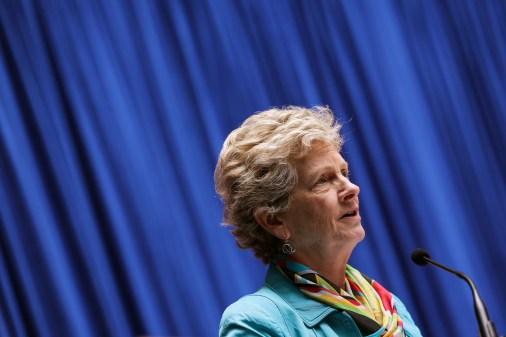CIOs starting to lay tech groundwork as TMF money hits agencies

With the first Technology Modernization Fund disbursements now beginning to hit agencies, tech leaders from the departments of Energy, Agriculture and Housing and Urban Development spoke Tuesday about how they were progressing on their IT modernization plans.
The TMF, which was created as part of the Modernizing Government Technology Act, sent $45 million to the three agencies in June as part of a loan program to help them modernize specific aspects of their IT infrastructures.
USDA CIO Gary Washington said Tuesday at the 2018 ACT-IAC Imagine Nation ELC conference in Philadelphia now that some of the early TMF funding is reaching his agency, his team is starting the prep work to get the modernization efforts going.
USDA received $10 million of the initial TMF awards to help modernize the citizen-facing elements of its Farmers.gov portal, which is coinciding with ongoing efforts to update its IT infrastructure through the Centers of Excellence IT modernization initiatives.
“Right now, there is a version of Farmers.gov out there and we continue to mature that for added functionality,” he said. “We’ve put the Wildfires and Hurricanes Indemnity Program out there, and now we are working on automating our farmer loan programs. Hopefully around early calendar year next year, we will be able to roll that out as well.”
Washington continued: “This is not something where they gave us some money and we’re just going to implement something and stop. This is going to be a continuing, maturing process using agile development and rolling out functionality every few weeks or a couple of months.”
The agencies have one year, or six months after the completion of their project, to make their first repayment installation. They are expected to pay back all funds received within five years of the award.
Washington said the TMF process has made it so that CIOs have to get buy-in from across the enterprise, especially requiring collaboration with other C-suite executives, like the chief financial officer.
“One of the things it’s really forced us to do is really think about cost-avoidance and cost-savings and [having] really serious planning and working together,” he said. “Because it forced the CIO, the CFO and the budget director to kind of come together to make this happen, so we really appreciated the process.”
Kevin Cooke, principal deputy CIO at HUD, said the agency is still waiting on the first disbursement of the $20 million it will receive to update and migrate its mainframe. But it hasn’t kept his team from getting to work.
“One of the things we did in preparation for this, and while we’ve been going through the process, is we took a section of the code for one of the systems and went ahead and fully tested to make sure that the platform change we are expecting to happen will work,” he said. “So the planning part has been done, and we’ve done sort of a mini-test in the meantime around a section of code to make sure what we’re thinking, the hypothesis will work.”
Denise Hill, a senior technical advisor for Energy, said her agency is in the midst doing network assessments and standing up sprint teams to implement the $15 million it secured to move its email systems to the cloud.
The trio said that with the first funds making their way to the agencies, they know that they will have to start demonstrating the progress they are making as the inaugural recipients of TMF awards. They said they will be leaning heavily on both the business cases crafted to justify the projects and strong guidance surrounding them.
“There are metrics in the business case,” Washington said. “We measure them at USDA. And not only do we measure them, I think we have to respond back to [the Office of Management and Budget] and [the General Services Administration] about our progress. We will continually do that on a monthly, if not a weekly, basis to make sure we are achieving our goals. Because at some point, we are going to have to report back in terms of success.”




